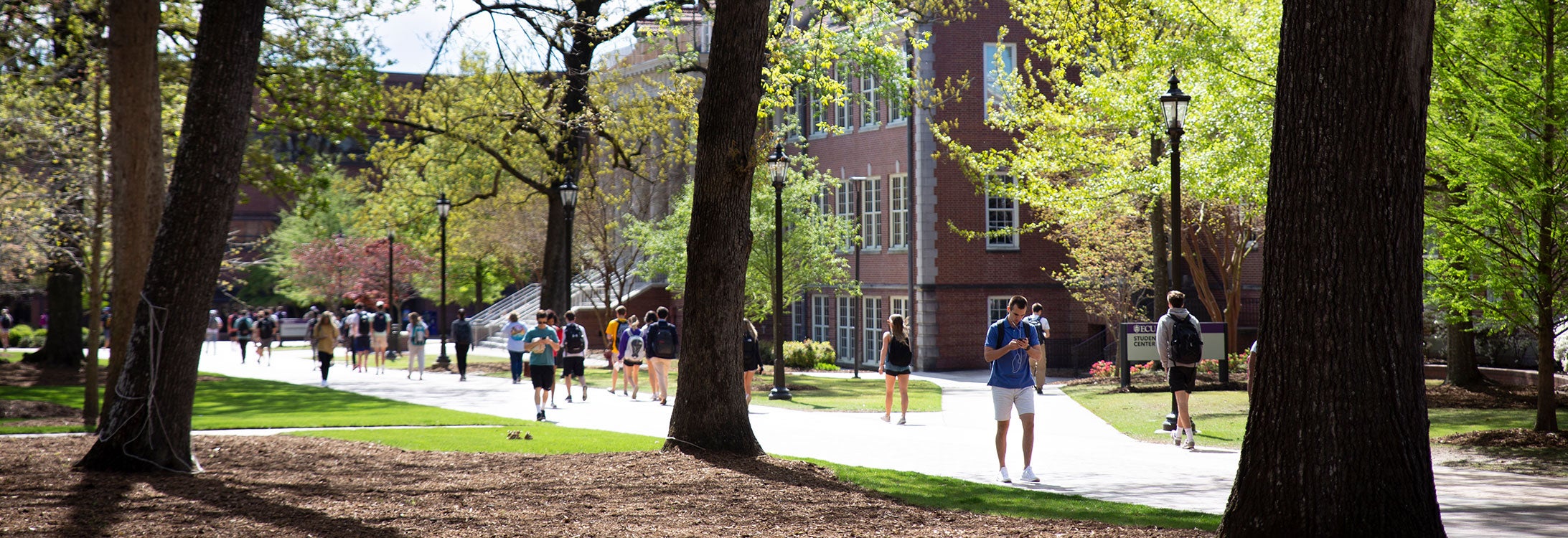Clinical Counseling
The Clinical Counseling with an emphasis in Addictions Master’s Program is a 62 credit-hour CACREP accredited clinical mental health counseling program which generally takes a full-time student two years to complete. The course work includes a combination of classroom and clinical study. Graduates are eligible for licensure as a Licensed Clinical Mental Health Counselor (LCMHC) and a Licensed Clinical Addiction Specialist (LCAS) upon passing an examination and the completion of a supervised work experience. Students graduating from the Clinical Counseling with an emphasis in Addictions program are provided a one-year reduction in the experience requirements for licensure as an LCAS by the N.C. Addictions Specialist Professional Practice Board. Without our degree, the required experience for this license is two years.
Graduates of the Clinical Counseling Program may be employed in community mental health and addictions settings such as inpatient or outpatient programs, detoxification centers, residential and halfway-house programs, and home-based counseling programs.
For more information about the Clinical Counseling with an emphasis in Addictions Master’s Program, contact Dr. W. Leigh Atherton at athertonw@ecu.edu or 252-744-6290.
Mission
The Clinical Counseling with an emphasis in Addictions program at East Carolina University serves students from North Carolina, the United States, and the world. The mission of the Clinical Counseling with an emphasis in Addictions program is to prepare qualified clinical mental health and addictions counseling professionals with the competence in the following foundational components germane to these specialty areas. These include counseling, prevention, and interventions; assessment and diagnosis, diversity and advocacy; and research and evaluation. This mission is accomplished by faculty working together in partnership with university colleagues, current and former students, and community agencies in the pursuit of excellence in clinical mental health counselor and addictions counselor education, supervision, practice, and research.
Scope of Clinical Mental Health and Addictions Problems
An estimated 25 million American adults experience serious psychological distress; 11 million receive treatment for mental health problems. Twenty million Americans (8% of the population) use illicit drugs, 55 million (23%) are binge drinkers, 16 million (7%) drink heavily, and 23 million (10%) need treatment for substance abuse. Many struggle with both mental health and substance use disorders.
Both issues negatively impact many areas of an individual’s life, including one’s physical and spiritual well-being, family and peer relationships, and employment and educational achievement.
Many employment opportunities exist for individuals with specialized knowledge and skills in clinical mental health and substance use/addiction counseling. East Carolina University is one of the few schools in the nation to offer a master’s degree in these disciplines.
Roles and Responsibilities
Clinical mental health and substance use/addictions counselors have many roles and responsibilities:
- To counsel individuals with mental health and substance use/addiction concerns,
- To work in mental health or substance use/addiction programs providing or coordinating counseling services such as assessment and diagnosis; person-centered treatment planning; drug detoxification; individual, group, and family counseling; vocational counseling; and coordination of medical services, and
- To work on interdisciplinary teams to address the needs of persons with mental health problems and substance use/addiction problems.
Work Settings and Salary Range
- Clinical mental health and addictions counselors work in a variety of public and private clinical mental health and substance use/addictions settings, serving outpatient and inpatient programs, drug detoxification centers, hospitals and clinics, partial hospital or day-treatment programs, employee assistance programs, and drug prevention programs. Salaries for clinical mental health and substance abuse/addiction counselors range from $45,000 to $65,000 yearly.
Entrance Requirements
Admission to the Graduate School requires:
- A baccalaureate degree from a regionally accredited college or university.
- Transcripts showing the baccalaureate degree and all other coursework completed at a college or universities.
- Two (2) professional letters of recommendation.
- Statement of intent, indicating reasons for seeking a master’s degree in Clinical Counseling with an emphasis in Addictions.
Admission of the Department of Addictions and Rehabilitation Studies at the graduate level requires:
- A personal interview with department faculty.
- A minimum of one year of sobriety before entering the program for any person recovering from a substance use disorder (alcohol and/or other drugs).
Application Procedures
Submission of an application to the Graduate School.
Financial Aid
Assistance with student loans is offered through the University’s financial aid office. Graduate assistantships (0 to 20 hours per week) may also be available to select full-time students contingent on funding availability. A limited number of scholarships are occasionally available as well; consult the Program Director to determine availability/eligibility requirements.
